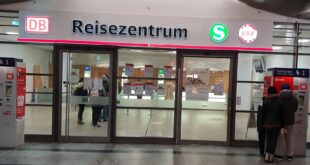A new month is here and we have put together some of the changes you should know about if you live in Germany. On the one hand, the first measures in the 2022 relief package to cushion the effect of rising energy costs enter into effect on 1 June. And there are also other important new regulations and laws.
Here are the changes to know about in Germany this June.
——-
9-Euro Ticket
To offset the impact of rising energy prices caused by the Ukraine war and encourage the use of public transport, the German government introduced a subsidised nationwide ticket which costs only 9 euros per month for travels on public transport during ninety days in the summer.
The 9-Euro Ticket is offered for the months of June, July and August.
Click HERE for detailed information about the 9-Euro Ticket
———-
Reduction of Fuel tax
From 1 June to the end of August, fuelling your vehicle should become cheaper due to a reduction of the energy tax on fuels to the minimum permitted in the EU.
The tax rate for petrol is to fall by almost 30 cents and for diesel by 14 cents. At the same time, no VAT will be charged on the portion of the energy tax that will be eliminated.
After the Russian attack on Ukraine, fuel prices in Germany skyrocketed. According to the ADAC, Super E10 peaked on 14 March at 2.203 euros on a daily average across Germany – a good 45 cents more than on the day before the outbreak of war. Diesel was most expensive on 10 March at 2.321 euros per litre – an increase of almost 66 cents compared to pre-war levels.
The governing coalition therefore decided to reduce energy taxes on fuels for three months – from the beginning of June to the end of August. It is hoped that the companies will pass this on to their customers.
———-
Heating cost allowance
A new law on heating cost subsidy will enter into effect in June. With it, the federal government wants to relieve low-income households of the added financial burden caused by the sharp rise in heating costs.
About 2.1 million people will receive a one-time subsidy payment for their heating costs. Those to benefit from the subsidy are students receiving Bafög who no longer live with their parents, recipients of housing allowance, recipients of vocational training allowance and people who receive Aufstiegs-Bafög.
No application is needed to receive the grant – it is transferred directly to the beneficiary’s account.
———-
Summer Time-table
The summer time-table for Deutsche Bahn and other transport companies will come into effect on 12 June, but with only minor changes. For example, Deutsche Bahn is once again offering a direct connection between Berlin and the North Sea island of Sylt. In addition, Chemnitz will be connected to the long-distance network after a decade and a half and will get connections to Berlin and on to the Baltic Sea without changing trains.
———-
Aldi and Lidl increase minimum wage
From June 2022, the minimum wage at Aldi will be raised from 12.50 euros to at least 14 euros an hour. This applies to both Aldi Süd and Aldi Nord.
Aldi’s competitor Lidl has also announced that the minimum wage for employees covered by collective agreements will be raised to 14 euros from June 2022 too.
———-
Ukraine refugees receive Hartz IV
Refugees from Ukraine will be entitled to regular social benefits such as Germany’s unemployment II benefit – known as Hartz IV – from June onwards. Until now, they have received lower welfare benefits under the Asylum Seekers Act.
The changes mean that the refugees can now benefit from integration offers for the labour market, such as counselling and support for job applications.
———-
Free transport for refugees from Ukraine ends
Refugees from Ukraine have been able to use public transport in cities and towns across Germany without a ticket since the outbreak of the war on 24 February. This regulation expires on 31 May 2022.
Refugees therefore require a ticket when travelling on public transport from 1 June.
An affordable alternative is the 9-Euro Ticket, which entitles holders to travel on public transport (regular buses, trams, underground trains, suburban trains, ferries and regional trains in 2nd class) for one month for only nine euros. The 9-Euro Ticket is offered for the months of June, July and August.
———-
Eased travel restrictions
From 1 June, people travelling into Germany will not have to show proof of vaccination, recovery or a negative test – known as the 3G rule. Travellers over the age of 12 have had to upload or show this proof before entering Germany until now.
This restriction is being eased until the end of August because of the falling coronavirus infection rates, Federal Health Minister Karl Lauterbach said.
The stricter rules for entry from ‘virus variant areas’ remain in place – but there are no designated variant areas at the moment.
———-
No more sick leave by phone
From the beginning of June, it will no longer be possible to receive a sick note from the doctor for a mild upper respiratory tract illness, such as a common cold, simply by calling the doctor.
Patients will have to go to the doctor’s practice again or use video consultation.
The current low coronavirus infection rates make it possible to let the special regulation, which has been extended several times, expire at the end of May.
Should the infection rates rise again, however, such special regulations could be reactivated for certain regions or nationwide.
Sick leave by telephone had been possible almost continuously since the end of March 2020. This was to reduce unnecessary contacts in order to lower the risk of infection.
———-
Vaccination certificates expire
Some digital COVID-19 vaccination certificates will expire as from 14 June. However, there is no medical reason for the vaccination certificates to expire now. Rather, it is due to a technical expiry date that was set during the programming of the certificate last year, when it was decided that the vaccination certificates would only be valid for one year.
Users of the Corona warning app or CoV passport app will receive a notification 28 days in advance. According to the Robert Koch Institute, the apps should update the certificate. Corresponding updates for this do not yet exist. However, pharmacies also reissue a vaccination certificate.
———-
Public holidays
- 6 June: Pfingstmontag (Whit Monday) – is a national public holiday in Germany so many employees will get the day off and shops will be closed.
- 16 June: Fronleichnam (Corpus Christi) – only for inhabitants of Baden-Württemberg, Bavaria, Hesse, North Rhine-Westphalia, Rhineland-Palatinate and Saarland
———-
Transcribing foreign driving licence eased
Until now, it was complicated for people with a driving licence that was not issued in the EU or the European Economic Area to apply for a new one in Germany. With an amendment to the Driving Licence Ordinance, people from Albania, Great Britain, Gibraltar, Kosovo and Moldova will be able to apply for a driving licence more easily from 1 June. More information on the regulations can be found on the website of the fine catalogue HERE.
Femi Awoniyi
 THE AFRICAN COURIER. Reporting Africa and its Diaspora! The African Courier is an international magazine published in Germany to report on Africa and the Diaspora African experience. The first issue of the bimonthly magazine appeared on the newsstands on 15 February 1998. The African Courier is a communication forum for European-African political, economic and cultural exchanges, and a voice for Africa in Europe.
THE AFRICAN COURIER. Reporting Africa and its Diaspora! The African Courier is an international magazine published in Germany to report on Africa and the Diaspora African experience. The first issue of the bimonthly magazine appeared on the newsstands on 15 February 1998. The African Courier is a communication forum for European-African political, economic and cultural exchanges, and a voice for Africa in Europe.

































